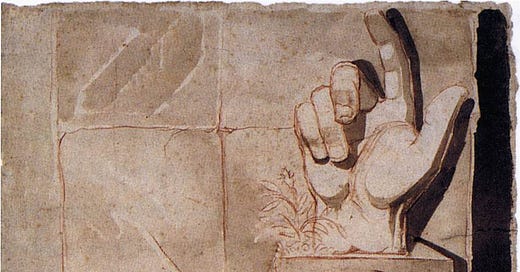On love, on grief, on every human thing, Time sprinkles Lethe's water with his wing. ~Walter Savage Landor
At the danger of sounding precious, I started Silver Door for several reasons, but primarily as a means to wrestle with my own vocation as a poet.
More than once I’ve attempted to make a hard break with poetry, to mixed results. But for mysterious and undoubtedly multitudinous reasons, God chose poetry as a means of ministering to me. I certainly do not encourage anyone to embark on such a grandiose project as “becoming a poet.” It’s all too easy to waste precious years, even a lifetime, in such a wild goose chase.
That said, outside of purely selfish reasons, through Silver Door I hope to provide for others the resources, that is, the raw material, which I wish I had had when first beginning my now decades-long career of chasing geese across the lawns of life. This is, of course, rather presumptuous on my part; I’m sure you’ll forgive me. I will confess I am and will remain an amateur botanist in the flowery field of letters, a passionate layman with an eye for wild blooms. It’s been some years since I’ve given up any pretense of surpassing who I once referred to as The Competition, or, as he’s commonly called, The Bard. Still, I have some talent. It would be disingenuous to suggest otherwise.
So it is in the spirit of presumptuous poise I introduce the upcoming series of essays on the book The Burden of the Past and The English Poet by Walter Jackson Bate. This little book, clocking in at just over 130 pages, is taken from Bate's series of lectures at the University of Toronto in 1969. It is pound for pound, page for page, the clearest, the most insightful, and wide-ranging text of poetry criticism of the 20th century. It will lay the groundwork for our future discussions, digressions, backyard dig jobs, intensive spelunking expeditions, and garden variety escapades into the world of poesy. You can buy it on Amazon.
In the Preface, Bate makes it clear he has “no feeling of the inevitable decline of the arts,” as so many today and during his own time felt. Regarding the artist’s relation to the past, he posits:
The pivotal period is the eighteenth century. It is this period that made the turn from Renaissance to modern. In the process it discovered the costs as well as the gains of a self-consciousness unparalleled in degree at any time before. If there was trauma, there was also honesty; honesty both to fact and to essential ideal. This is what is most relevant—perhaps reassuring—about the eighteenth century to us now as we look for companionship or help in our own attempt to clear the head and get closer to essentials.
These lectures, from the late 60s remember, were given to men and women raised before the ubiquity of television and other electric media. Bate could not have imagined the devastation these new technologies would inflict on the art of poetry and its public perception. The latter half of the 20th century became progressively more and more a period of willful cultural forgetfulness, culminating in the so-called “end of history.” Annoyingly, it appears our age has inherited all of the psychic trauma and little of the honesty of our 18th century forebears. Most are more inclined to refuse the past entry into the crowded present than to entertain it long enough to feel inferior, let alone “get closer to essentials.”
But despair is the devil’s driving whip. I see no reason a revival of the arts, and poetry in particular, cannot come about within my lifetime. For all of our age's digitally mediated madness, there is now a quickening desire within a remnant of poets and artists to take on the burden of the past. What can be accomplished after that is for us to see and do.
Next week, I’ll cover the first of the four lectures, titled “The Second Temple,” where Bate begins by asking, “What is there left to do?”




